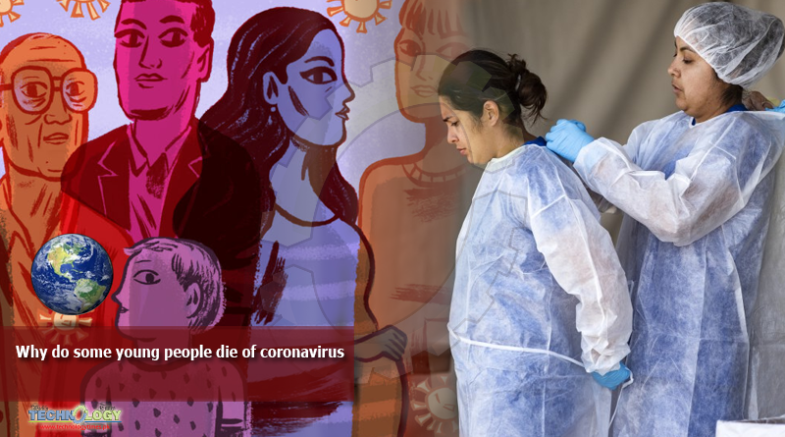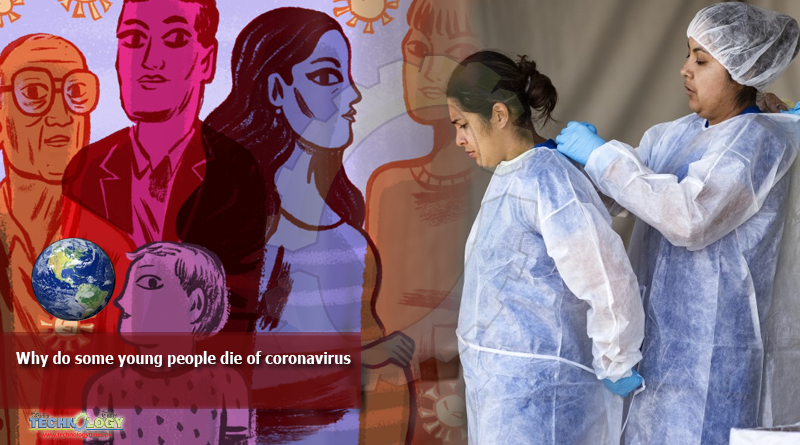It remains one of the biggest puzzles of the coronavirus pandemic. The disease generally causes serious problems only in older people or those with underlying health problems. But occasionally it strikes down young, apparently fit individuals, including medical staff exposed to patients with the virus.

In some cases, previously undiagnosed conditions are later revealed but in others no such explanations are available, leaving scientists struggling to find reasons for the behaviour of the coronavirus.
It is very possible some of us could have a particular genetic make-up that makes it more likely we will respond badlyMichael Skinner, ICL
Several theories have been proposed. Some researchers believe the amount of virus that infects an individual may have crucial outcomes. Get a huge dose and your outcome may be worse. Others argue that genetic susceptibility may be involved: in other words, that there are individuals whose genetic makeup leaves them more vulnerable to the virus as it spreads through their bodies.
This latter idea is favoured by virologist Michael Skinner at Imperial College London. “It is very possible that some of us could have a particular genetic makeup that makes it more likely that we will respond badly to an infection with this coronavirus,” he said.
An example of such susceptibility is provided by the herpes simplex virus, which causes cold sores. In some people, a mutation that affects cell receptors known as TLR3, in their central nervous system, leaves them unable to deal with the worst impact of the virus: they contract a disease called herpes simplex encephalitis, which can lead to seizures and convulsions in children.
“It could be that we are seeing a similar sort of susceptibility in some individuals who get Covid-19, and that leads them to suffer more acutely from serious side-effects,” added Skinner.
Whether there is a link between a high viral load and worse outcomes is going to be important to find outAlison Sinclair, Sussex University
Others, however, suggest that the amount of virus that a person is infected with could be a crucial factor in determining their outcome. Such individuals are said to be affected by a high viral load.
“A person with a high viral load has more virus particles than one with a low load,” said virologist Alison Sinclair at Sussex University. “We do not yet know what impact viral load has on the symptoms of a person infected with Covid-19. Whether there is a link between a high viral load and worse outcomes is going to be important to find out.”
Share your story
Share your stories
If you have been affected or have any information, we’d like to hear from you. You can get in touch by filling in the form below, anonymously if you wish or contact us via WhatsApp by clicking here or adding the contact +44(0)7867825056. Only the Guardian can see your contributions and one of our journalists may contact you to discuss further.
Tell us
This point was backed by Edward Parker at the London School of Hygiene and Tropical Medicine. “For Covid-19, early reports from China suggest that the viral load is higher in patients with more severe disease, which is also the case for Sars and influenza.
“So it is crucial for us to limit all possible exposures to Covid-19, and if we are feeling unwell we need to observe strict self-isolation measures to limit our chance of infecting others.”
- Due to the unprecedented and ongoing nature of the coronavirus outbreak, this article is being regularly updated to ensure that it reflects the current situation at the date of publication. Any significant corrections made to this or previous versions of the article will continue to be footnoted in line with Guardian editorial policy.
Since you’re here…
… we’re asking readers like you to make a contribution in support of our open, independent journalism. In these frightening and uncertain times, the expertise, scientific knowledge and careful judgment in our reporting has never been so vita . coronavirus No matter how unpredictable the future feels, we will remain with you, delivering high quality news so we can all make critical decisions about our lives, health and security. Together we can find a way through this.
You’ve read 18 articles in the last four months. We believe every one of us deserves equal access to accurate news and calm explanation. So, unlike many others, we made a different choice: to keep Guardian journalism open for all, regardless of where they live or what they can afford to pay. This would not be possible without the generosity of readers, who now support our work from 180 countries around the world.
We have upheld our editorial independence in the face of coronavirus the disintegration of traditional media – with social platforms giving rise to misinformation, the seemingly unstoppable rise of big tech and independent voices being squashed by commercial ownership. The Guardian’s independence means we can set our own agenda and voice our own opinions. Our journalism is free from commercial and political bias – never influenced by billionaire owners or shareholders. This makes us different. It means we can challenge the powerful without fear and give a voice to those less heard.
https://www.theguardian.com/world/2020/apr/05/severe-covid-19-illness-in-young-down-to-genes-or-viral-load-scientists-sayYour financial support has meant we can keep investigating, disentangling and interrogating. It has protected our independence, which has never been so critical. We are so grateful.
We need your support so we can keep delivering quality journalism that’s open and independent. And that is here for the long term. Every reader contribution, however big or small, is so valuable.
Originally Publish at: https://www.theguardian.com/
